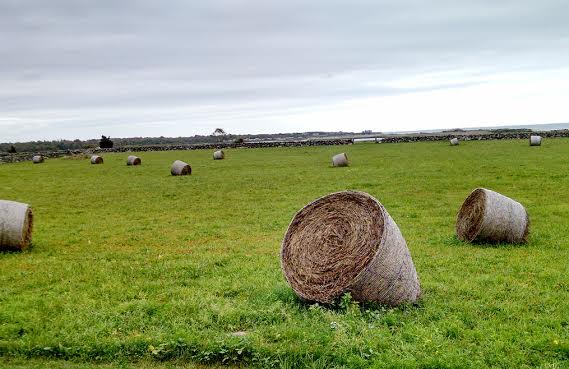(Photo by CHARLES PINNING)
Hay bales on a Little Compton, R.I., farm
One languorous August afternoon, my friend Peter Lapin phoned to tell me that a farmer near where he lived in Middletown, R.I., would pay us $120 apiece for a week of loading hay. My parents had been on my case for laying around all summer, so I agreed.
“Good luck,” scoffed my older brother, busy patching a ding on his surfboard. “Get ready to suffa. And on the way, watch out for the cow pies!”
“Yeah-yeah, blah-blah,” I responded.
“Gerbil,” he deadpanned. “Why do you think a stud like me is a lifeguard instead of working on Old MacDonald’s Farm? You’ll find out.”
Equipped with iron hooks and work gloves that were too big for us, we traipsed behind a lumbering stake body truck, wrestling bales of hay up onto the bed as it belched stinking black exhaust.
All week the sun blazed in a cloudless sky and the humidity soared. It was backbreaking work for two 13-year-old boys whose bodies hadn’t really developed yet. Our legs got scraped up and the inside of our forearms were scratched and welted. We were drenched in sweat, hair matted, eyes stinging, hay dust filtering down into our cut-offs.
At night, I spread Noxzema on my red cheeks and shoulders, doused my welts with witch hazel and swabbed my scrapes with clear merthiolate. After dinner I fell into bed, senseless and sore.
But come Friday afternoon, it was all over — the fields were clear, the hay was in the barn, and the farmer paid us $120 in cash, each.
“Hey,” said Peter, “Let’s go to the beach!”
We bicycled over to Easton’s Beach, threw down our bikes and raced across the hard sand into the water.
Heaven! The waves were good, the cool water balm to my scorched flesh. After bodysurfing a couple, I suddenly panicked. I jammed my hand into the pocket where I’d folded my money and it was gone. All $120 was gone!
I twisted hopelessly, searching the surface then staggered out of the water and flopped face down on the sand. I couldn’t say anything to Peter, who’d had the good sense to shove his money into a shoe. He would laugh, called me stupid, make me feel worse than I already did. When we bicycled home in our separate directions, tears streamed down my face.
I hid in my room until my mother came knocking.
“Clean up and come down for dinner. We’re celebrating with your favorite!”
“I’m not hungry,” I said in a low voice.
“What?”
“Nothing!” I shot back.
On the table was spaghetti and shrimp in a cream sauce.
“We’re really proud of you,” my father said. “You stuck it out on the hottest week all summer. Real bull-work under tough conditions. Congratulations.”
“Any plans for the money, sweetheart?” asked my mother.
“Just enjoy it, son,” said my father. “You’ve earned it. Have a good time with it. Why not take Anna out to a movie. I’m sure she’d like that.”
Anna was my next-door neighbor who’d moved in only a year ago. I would’ve loved to have taken her to a movie. She was the nicest girl I’d ever met, actually.
After dinner I went up to my room and curling into a ball, cried myself to sleep.
In the morning, I woke up to the horror that it hadn’t been a dream. I stayed in my room all day, doing my summer reading. I finally came down for dinner and was bumping my shoulder up against a doorway when my brother came whooping into the house.
“Dig it, gerbils: another big day for the stud!”
Strutting into the living room, he twirled once around. “Guess what the good news is?” he asked.
“You saved someone’s life!” said my mother expectantly.
“You decided to get a haircut,” said my father.
“Well, gerbil, what about you?”, he asked me.
“I have no idea, stud. You’re getting married.”
“Studs don’t get married, gerbil. I found a hundred bucks on the beach! No lie! Life is good!”
Charles Pinning is a Providence novelist.










